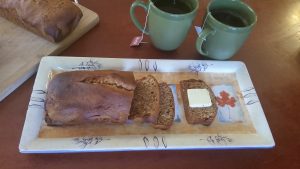There is no escaping the similarities between us. Mom and I look alike. We dress alike. (We both wore blue dresses on Rosh Hashanah, and on Sunday, we were wearing black skirts and white t-shirts, definitely unintentional on my part.) We walk alike. And our voices are somewhat similar, too, despite my American versus her British accent.
I am reminded of these facts every time we are together. It is not something I can avoid: it is genetically determined. I keep wondering how it reflects on me. To what extent do people separate us as two distinct individuals and to what extent do they mentally connect us as being almost identical?
I see myself in her. I, too, am aging. Will I become like Mom? There are age spots on her hands and arms, her toes are curling in, her eyes are sometimes watery. I can accept the physical resemblances. It’s the worry that there are also cognitive parallels that are harder to swallow.
For me, I'm more used to thinking about myself relative to my children. As parents, we strive to make our children like us. As children, we’ve probably spent the better part of our lives individuating from our parents, finding our own path, rejecting so much of what they taught us and held dear. In both parent-child and child-parent relationships, the tangible and the intangible—common facial features and also tastes and desires—meld and war within us; we forget how alike we really are, so caught up are we in our struggle (and they in theirs) for independence.
I haven’t lived in the same city as my parents since I was 18. That’s a long time to have sustained my separate life. And my children are not really at home now, either, having grown and chosen their own paths. Yet we are all genetically tied together. It is important to acknowledge our similarities—perhaps even embrace them. It is equally important to allow for each of us to maintain our uniqueness in our own generation.
As with all children, I am a product of two parents. I definitely have my dad’s genetic material in me, too. In my immediate family, my brother Simon inherited our mom’s outgoing personality. I am more pensive, like my dad. And, yet, being with Mom, I must assume a more outward disposition. I run interference for her when we’re out walking. But I’m struggling with the notion that I cannot be responsible for Mom’s interactions with people. Not everyone we meet and talk to is aware of her Alzheimer’s, and I can’t quite tell them when she’s in the middle of explaining some nonsensical thing or angrily voicing her negativity that there is a reason for her odd behavior. It reminds me of when I was a little girl and wanted to disappear when my parents did something that embarrassed me (like speak English with a British accent). Except I’m an adult now, and I can’t run away.
Once during a troubling experience with a friend, I was yelled at for being just like my mom. I took instant offense to that, being of an age where any reference to our similarities was an insult. Today, I understand that I am who I am because of the intellectual and emotional atmosphere in which I was raised. I thank God for making me similar to such a wonderful, loving, vivacious woman, one whom I dedicate myself to protecting as much as I can.
And so I find myself eating honey cake, this being the season, its sweetness seeping into me and making my life a little more joyful. This is a light cake buoyed by the love I sifted in—and the egg whites.
Honey Cake
I ate my piece slathered in butter. It was really good.
3 eggs, separated (or 2 large eggs) 4 tablespoons oil ¾ cup honey 1 cup flour 1 teaspoon baking soda 1 teaspoon cinnamon 1 teaspoon vanilla
Directions:
In a large mixing bowl, combine the egg yolks and oil and then add the honey and dry ingredients. In another bowl, beat the egg whites until stiff. Fold into batter. Pour into a loaf pan and bake at 350° for 30 minutes.
About the Author: Miriam Green writes a weekly blog at http://www.thelostkichen.org, featuring anecdotes about her mother’s Alzheimer’s and related recipes. Her poetry has appeared in several journals, including Poet Lore, the Prose Poem Project, Ilanot Review, The Barefoot Review and Poetica Magazine. Her poem, “Mercy of a Full Womb,” won the 2014
Jewish Literary Journal’s 1st anniversary competition. She holds an M.A. in Creative Writing from Bar Ilan University and a B.A. from Oberlin College
. Miriam is a 20+-year resident of Israel and a mother of three. Her parents recently moved down the street from her.
Learn More: